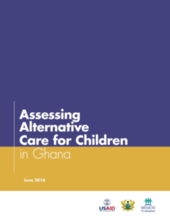In 2017, MEASURE Evaluation worked with a country core team (CCT) in Ghana, led by the Department of Social Welfare (DSW) of the MOGCSP, to engage government partners and other stakeholders to design, plan, and conduct a participatory self-assessment of the national alternative care system that will support the government and its partners in continuing to advance alternative care.
The assessment framework, finalized with input from USAID headquarters, USAID field offices, and 23 stakeholder interviews in Ghana, covered nine areas of alternative care: (1) prevention of unnecessary child- family separation; (2) foster care; (3) residential care; (4) semi-independent living (in other countries, sometimes called “supervised independent living”); (5) kinship care; (6) “other forms” of care; (7) adoption; (8) family reunification and reintegration; and (9) system deinstitutionalization (DI). Each area of care was assessed through a systems strengthening lens, comprising six system components: (1) leadership and governance; (2) service delivery mechanisms; (3) workforce; (4) monitoring, evaluation and information systems; (5) social norms and practices; and (6) financing. This type of assessment is emblematic of a holistic approach to examining all aspects of health and social service programs and the enabling environment meant to support them.
This report presents the findings of the assessment. The findings were reviewed and validated by the DSW and CCT. They are summarized in this report, organized by the following system components:
-
Leadership and governance
-
Service delivery
-
Workforce
-
Monitoring, evaluation, and information systems
-
Social norms and practices
-
Financing

